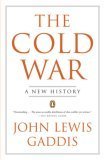More on this book
Community
Kindle Notes & Highlights
Because the Anglo-American relationship with the Soviet Union had fallen into this pattern well before World War II ended, it is difficult to say precisely when the Cold War began. There were no surprise attacks, no declarations of war, no severing even of diplomatic ties. There was, however, a growing sense of insecurity at the highest levels in Washington, London, and Moscow, generated by the efforts the wartime allies were making to ensure their own postwar security. With their enemies defeated, there was less of an incentive for these former allies, as they were coming to think of
...more
Three initiatives followed: Stalin delayed the withdrawal of Soviet troops from northern Iran, where they had been stationed since 1942 as part of an Anglo-Soviet arrangement to keep that country’s oil supplies out of German hands. He demanded territorial concessions from Turkey as well as bases that would have given the U.S.S.R. effective control of the Turkish Straits. And he requested a role in the administration of former Italian colonies in North Africa with a view to securing one or more additional naval bases in the eastern Mediterranean.
They surprised Stalin by taking the continued Soviet occupation of northern Iran to the United Nations Security Council early in 1946, in the first significant use of the new world organization to deal with an international crisis.
Kennan responded to the latest in a long series of State Department queries with a hastily composed 8,000-word cable, dispatched on February 22, 1946. To say that it made an impact in Washington would be to put it mildly: Kennan’s “long telegram” became the basis for United States strategy toward the Soviet Union throughout the rest of the Cold War.
Soviet leaders had to treat the outside world as hostile because this provided the only excuse “for the dictatorship without which they did not know how to rule, for cruelties they did not dare not to inflict, for sacrifices they felt bound to demand.”
What would be needed, as Kennan put it in a published version of his argument the following year, was a “long-term, patient but firm and vigilant containment of Russian expansive tendencies.”


